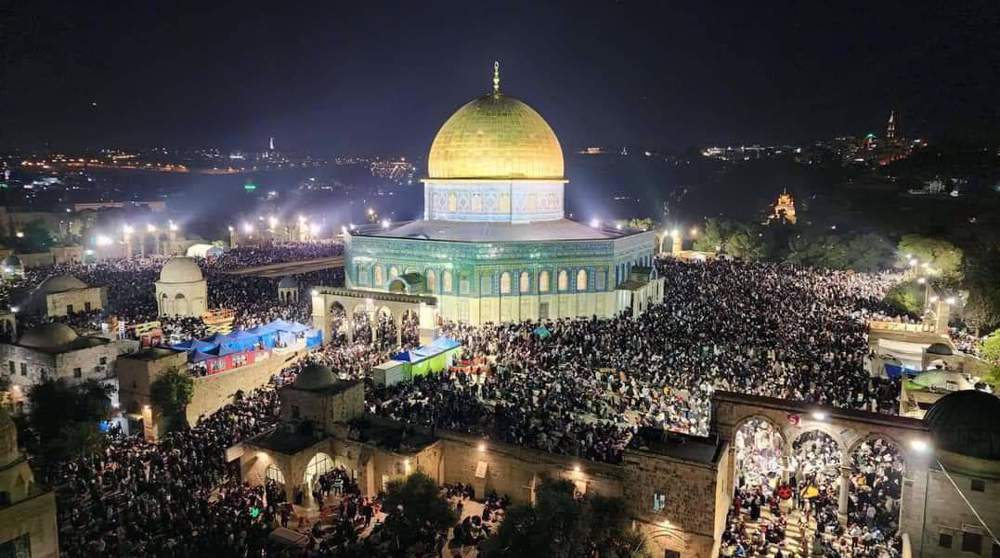AhlulBayt News Agency: Nearly 300,000 Palestinians observed 'Laylat al-Qadr' (Night of Destiny) at al-Aqsa Mosque in the occupied Jerusalem al-Quds on Monday night despite stringent curbs imposed by the Israeli regime.
According to reports, about 280,000 Muslim worshippers from the occupied West Bank and al-Quds participated in night-long prayers on the occasion of Laylat al-Qadr at Islam's third holiest site.
Laylat al-Qadr marks the night when the Holy Quran was revealed to Prophet Muhammad. It is believed to have taken place on one of the final ten odd nights of the holy month of Ramadan.
The religious gathering was held despite the high presence of Israeli forces at the gates of al-Aqsa Mosque and the barriers erected around al-Quds.
A spokesman for the Palestinian resistance movement Hamas Mohammed Hamada said the presence of worshippers in al-Aqsa Mosque “has undermined the prestige of the Israeli occupation.”
Stressing that the presence of worshippers at al-Aqsa would thwart Israel’s plots to Judaize al-Aqsa and al-Quds, the spokesman urged worshippers to continue to flock to the al-Aqsa Mosque compound even after the holy month of Ramadan.
Since the start of Ramadan this year, Israeli forces have carried out several deadly raids at the mosque, attacking peaceful worshippers during prayers, with an aim of paving the way for incursions by illegal Israeli settlers.
Illegal settler incursions under police protection to the al-Aqsa mosque have been on the rise in recent years, which has led to frequent confrontations with Palestinians at the mosque, with many Palestinians injured, arrested, or killed.
The al-Aqsa Mosque compound, which sits just above the Western Wall plaza, houses both the Dome of the Rock and the al-Aqsa Mosque.
The Jewish visitation of al-Aqsa is permitted, but according to an agreement signed between Israel and the Jordanian government in the wake of Israel’s occupation of East al-Quds in 1967, non-Muslim worship at the compound is prohibited.
/129
According to reports, about 280,000 Muslim worshippers from the occupied West Bank and al-Quds participated in night-long prayers on the occasion of Laylat al-Qadr at Islam's third holiest site.
Laylat al-Qadr marks the night when the Holy Quran was revealed to Prophet Muhammad. It is believed to have taken place on one of the final ten odd nights of the holy month of Ramadan.
The religious gathering was held despite the high presence of Israeli forces at the gates of al-Aqsa Mosque and the barriers erected around al-Quds.
A spokesman for the Palestinian resistance movement Hamas Mohammed Hamada said the presence of worshippers in al-Aqsa Mosque “has undermined the prestige of the Israeli occupation.”
Stressing that the presence of worshippers at al-Aqsa would thwart Israel’s plots to Judaize al-Aqsa and al-Quds, the spokesman urged worshippers to continue to flock to the al-Aqsa Mosque compound even after the holy month of Ramadan.
Since the start of Ramadan this year, Israeli forces have carried out several deadly raids at the mosque, attacking peaceful worshippers during prayers, with an aim of paving the way for incursions by illegal Israeli settlers.
Illegal settler incursions under police protection to the al-Aqsa mosque have been on the rise in recent years, which has led to frequent confrontations with Palestinians at the mosque, with many Palestinians injured, arrested, or killed.
The al-Aqsa Mosque compound, which sits just above the Western Wall plaza, houses both the Dome of the Rock and the al-Aqsa Mosque.
The Jewish visitation of al-Aqsa is permitted, but according to an agreement signed between Israel and the Jordanian government in the wake of Israel’s occupation of East al-Quds in 1967, non-Muslim worship at the compound is prohibited.
/129

